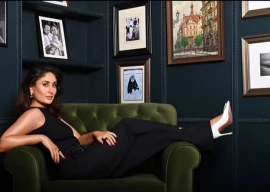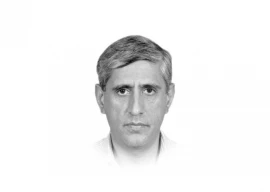1687859447-0/shaanshahidet23-(1)1687859447-0.png)
In a recent interview with Express Entertainment's The Talk Talk Show, renowned Pakistani actor Shaan Shahid discussed his journey from Armaghan to Shaan, his issues with the current film industry, and how he would overcome struggles with different languages.
With 33 years of work under his wing, Shaan spoke candidly about the challenges faced by the Pakistani film industry, emphasising the need for unity and audience-centric storytelling. Additionally, he discussed the transition from Urdu to Punjabi films and the importance of connecting with diverse audiences.
When the host, Hassan Chaudhary, said that he cannot just call the superstar by his name, asking whether his real name is Armaghan, Shaan confirmed that it is. "Yes, my real name is Armaghan," said the actor. "When I was at Aitchison College, my name was Armaghan." When asked if the name was still on his official documents, Shaan said, "Not anymore. When I was in New York, it was Armaghan till then on my passport. But then we got the name changed when I joined films because I think Armaghan was difficult for people to pronounce. People struggled in school to call me Armaghan."
When he was asked about the meaning of Armaghan, he said, "Armaghan-i-Hijaz is a book by Allama Iqbal, my name Armaghan was taken from there. It means present, it's Persian. And my brother's name is Hijaz. We have heavy Persian influences because my paternal grandfather was an interpreter for Persians in the early 30s," explained Shaan.
Reflecting on his journey from Armaghan to Shaan, the actor explained that when he started working on the film Bulandi, a collective decision was made to modify his name. They took inspiration from his father Riaz Shahid's name, incorporating the "sh" sound, and added the letter "n" from actress Neelo's name. "When Bulandi started, we all sat down and decided, 'We should change the name.' So they took Riaz Shahid's 'sh,' Alif Allah, and 'n' from Neelo."
Shaan also highlighted the prevalent ego clashes and the lack of consideration for the audience during the decision-making process. According to him, pre-production is a crucial stage where choices are made, and if the script and casting decisions are not given due importance, it affects the overall quality of the film.
"We still haven't reached the Promised Land," said Shaan. "The divide is too big between the filmmakers. Egos interrupt important decisions. We don't think about the audience. We think about our circle. Who will be happy in my circle? 'I don't like him, I won't offer it to him.' I think the film is destroyed in pre-production...You're making choices...There are very few scripts, like The Terminator script or the Rocky script, which are iconic scripts. Mostly, a script tells you its cast. It makes you feel as a director that this is the character you're looking at. It's not like that here. Here, it's mostly, who's in the group? When you don't do justice to the script, the script doesn't do justice to you."
Shaan estimated that he has acted in over 600 films throughout his career. When asked about the majority being Punjabi films, he clarified that the average has been fairly balanced. "I think the average is quite balanced," responded Shaan. "The first six, seven years were all about Urdu films. Cinema was headed towards a new revival, Punjabi films were going out, Urdu films were coming in. Romantic scripts were coming in. I feel there was a huge spam that we did - quick films. If directors then didn't find scripts, they'd pick up an Indian film's script and do it, but production was happening a lot."
Continuing further, Shaan stated, "After that, there was a huge gap. I went back to New York, I wanted to know what I was doing. I come from a background where my father used to write films, direct films. When I felt that this is what I want to do my whole life, I should know what I'm doing. When I came back, the trend had changed. Punjabi was in. Region-specific films - because Karachi was not making films then - when Urdu films came to Punjabis, they were no longer Urdu films. Karachi stopped making films, they went towards plays."
The actor went on to explain how he was called to convince his audience of his roles. "I felt then that as an actor, my job is to convince the audience that this is who I am," said Shaan. "I shouldn't be anybody who is picking up, that this is a Pashto film, this is a Sindhi film - it's a Pakistani film. I made a choice, and I said that I need to entertain people who do not get entertained. Even today, you've kicked out the masses from the cinema. Nobody goes to the cinema because the cinema has become so expensive. And all your masses are on 4G watching old Punjabi films on YouTube. I think we took out a huge segment and refused to cater to them, with today's cinema."
Shaan also discussed the struggles he faced due to his Americanised accent and lack of fluency in Punjabi. To overcome these challenges, he hired a language expert who helped him understand the depth of the Punjabi language and its pronunciation nuances. "When I used to work in Punjabi films - I still can't read Punjabi," began Shaan. "Then I hired people. I, as an actor, knew I had to create that quality within myself. Even today, if I have a Punjabi script, I have a person who speaks to me...I follow the voice. That actually tells me the depth of Punjab, how to say a word. Explained that he grasped the tone in such a way."
Have something to add? Share it in the comments below



1728127649-0/BeFunky-collage-(2)1728127649-0-165x106.webp)
1727242355-0/Diddy-(1)1727242355-0-165x106.webp)





1725868632-0/Untitled-design-(50)1725868632-0-270x192.webp)






COMMENTS (1)
Comments are moderated and generally will be posted if they are on-topic and not abusive.
For more information, please see our Comments FAQ